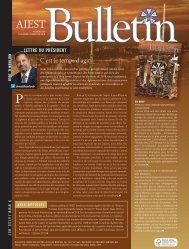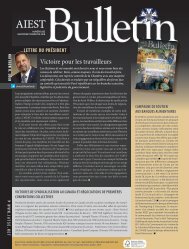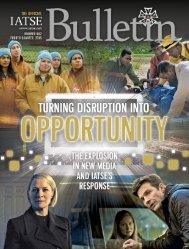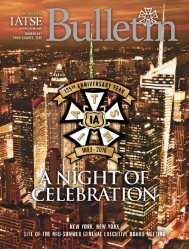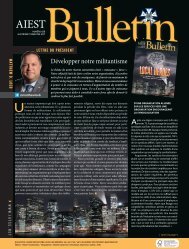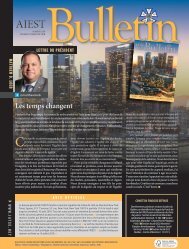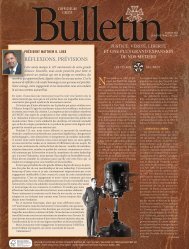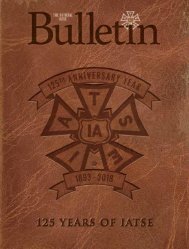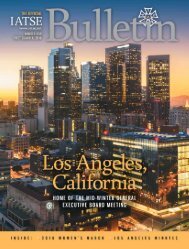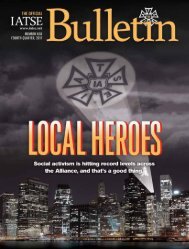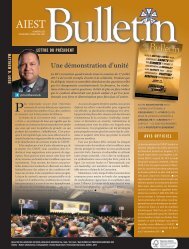The Official Bulletin - Quarter 2, 2019
- No tags were found...
You also want an ePaper? Increase the reach of your titles
YUMPU automatically turns print PDFs into web optimized ePapers that Google loves.
finished a run as Production Carpenter in the Broadway production<br />
of Anastasia. “Now, there are winches with multiple<br />
motors that move performers in any direction three dimensionally,<br />
controlled by computers.”<br />
Before Anastasia, Munroe worked on Hedwig and the<br />
Angry Inch. “I flew Neil Patrick Harris on every show,” he said.<br />
“I’m hooking him up and operating the console. I tell the computer<br />
when and where to fly him based on cues from the stage<br />
manager. I’m also monitoring the cables, motors and everything<br />
else in real time to make sure it’s all safe. It requires a lot<br />
of high tech skills, a lot of training, and many rehearsals to get<br />
the flight path set.<br />
“Instead of carpenters manually moving scenery around<br />
in between scenes, you now have automated flying scenery<br />
on most productions,” he added. “On Anastasia, we had flying<br />
scenery, three turntables and a wirelessly operated train. During<br />
the production, you’re overseeing everything happening on<br />
stage, making sure everything is going right, constantly making<br />
adjustments, and ready to step in instantly in case anything<br />
goes awry, because the safety of the actors and crew depends<br />
on it.<br />
“<strong>The</strong> advent of high efficiency electronics and smaller motors<br />
is letting automation go where it couldn’t go in the past,<br />
into smaller, tighter spaces, and it can do more, too,” Munroe<br />
said.<br />
King Kong’s Elman echoed his comments, saying, “the<br />
change from DC to AC motors has helped shrink the size of<br />
physical pieces. Everything is digital now for the most part.<br />
Control and information all happen a lot quicker. It’s easier to<br />
diagnose problems when they occur because you’re always<br />
getting feedback. <strong>The</strong> gear itself is better at self-diagnosis.<br />
Ironically, when we have problems it’s often because the gear<br />
is based on factory robotics technology and it’s meant to run<br />
24/7, rather than being used for three hours a night and being<br />
turned on and off each day.”<br />
Kevin Hoekstra, a member of Local 26 and Head Carpenter<br />
on the Dear Evan Hansen national tour, described his production<br />
as probably the most technologically intensive show<br />
currently on tour. “We have twenty-four automated scenic effects,”<br />
he said. “Our automation system for scenery is tied in<br />
with our lighting and projection systems so that everything is<br />
projection mapped. We have six laser projectors tracking the<br />
positions of all the scenery in real time. Our sound system is<br />
tied in, too, and linked with lighting cues. Everything is interconnected.<br />
“Every sequence of scenery movement starts with an automation<br />
operator pushing a button,” Hoekstra explained. “It’s the<br />
same with lighting. Some are multi-part sequences where one<br />
action triggers another. <strong>The</strong> Head Audio is up front mixing the<br />
show live. So while everything is scripted and pre-programmed<br />
to the best extent possible, human beings are still in control.<br />
It has to be this way, because if a show was completely automated,<br />
it wouldn’t account for any variations — for example, if<br />
an actor is standing in the wrong place or skips a line. We also<br />
have manual controls for safety, especially with scenic automation.<br />
Even when the computer is running cues, I have an operator<br />
ready to hit stop if anything goes wrong.<br />
“<strong>The</strong> work I do now is almost unrecognizably different<br />
than when I started,” Hoekstra said. “While the end product<br />
the audience sees is similar, the way we get there is different<br />
and the sophistication of the production is much different.<br />
<strong>The</strong> first shows I worked on had no automation. Stagehands<br />
pushed the scenery on stage. And while it’s rare for a show to<br />
“While everything is scripted and<br />
pre-programmed to the best<br />
extent possible, human beings<br />
are still in control.”<br />
Kevin Hoekstra, Local 26 member<br />
and Head Carpenter on Dear Evan Hansen<br />
SECOND QUARTER <strong>2019</strong> 29





